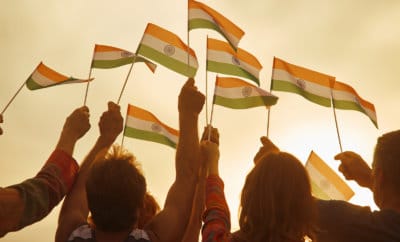India
Karnataka State Flag Debate, A World View

Karnataka wants a separate flag for itself. The South Indian state has had an unofficial ‘Kannada flag’ since the 1960s. The red and yellow flag is hoisted across the state on Karnataka Rajyotsava Day, but the state government recently set up a panel to explore if the state can officially have its own separate flag.
Countries with Separate State Flags
The separate flag debate is not new to the world. While countries like the United States and Brazil have long had individual state flags, there have been controversies like the historic voting in Mississippi to retain the state flag with a ‘divisive symbol’. The people of Mississippi voted to retain the state flag design in the name of ‘conserving the region’s heritage’.
A state flag is usually a variant of a national flag or sometimes completely different in its colour and design. However in almost every case, state flags are accorded less significance in comparison to national flags. The American flag, for example, when displayed with the other flags, ‘should be larger than the other flags or relatively equal to the size of the largest flag’. If a state, local or society flag is flown on the same location with the American Flag, the American Flag should be at the top.
For many, the state flag is nothing but a symbol that binds them locally and regionally. For others, it can be a serious assertion of ‘separate identity’. It is this fear of ‘separation’ and fragmentation of a ‘unified identity’ that has resulted in a social media storm on the separate flag issue in Karnataka.
Indian Context
In India, the state of Jammu and Kashmir is the only state that is allowed to have its own flag. The Jammu and Kashmir Prevention of Insult to State Honors Act 1979 ensures that the state flag is up at almost every state function and administrative building. The J&K flag has been in existence since 1972.
The demand for a separate flag for Karnataka is not new. It is rooted in the Gokak agitation of the 1980s that called for first-language status for the Kannada language in Karnataka. Since then, the nexus of pro-Kannada groups and local political parties has ensured that the issue of a separate state flag is kept alive. In a country that has long relied on identity politics, the whipping up of regional pride is a political weapon often used to assert federal rights and negotiate power with the central government.
It is for these reasons that many are seeing the Karnataka flag issue as, ‘some kind of a ‘Chanakyan counter’ to the Hindutva debate.’ Another side of the state flag debate, however, is more worrying and has potential to cause trouble.
Politics and Jingoism
In the JP Nagar area of Bengaluru, 11 members of a pro-Kannada outfit were arrested recently for threatening to burn down the shop of a shoe retailer who was selling yellow sandals. Their argument was that yellow and red were the shades ‘sacred’ to the existing Kannada flag and that the colours couldn’t be used on sandals. They asked the shoe retailer to pay Rs 5 lakh to prevent his shop from being taken down.
“The kind of chauvinistic forces that the flag debate could possibly unleash was illuminated in the crime section of a Kannada newspaper… If this is the situation with an unofficial flag, it isn’t hard to imagine the legitimacy such activity would derive with an officially-sanctioned flag. The ‘insider’ and ‘outsider’ distinctions would only sharpen, grow and create a Sena-style fear across the state,” writes journalist and commentator Sugata Srinivasraju in The Wire.
Whether the separate state flags or a ‘union jack’ may or may not divide or bind a country is something the world has enough evidence of. The 50 ‘United states’ of America have largely lived in peace, proudly displaying 50 different flags under one name. In India, the ‘separatist movements’ remain a bitter reality of the ‘sovereign’ nation.
Karnataka’s demand for a separate flag is feasible constitutionally, but the impatience, politics and jingoism around the issue motivates one to rethink and revisit the idea.



